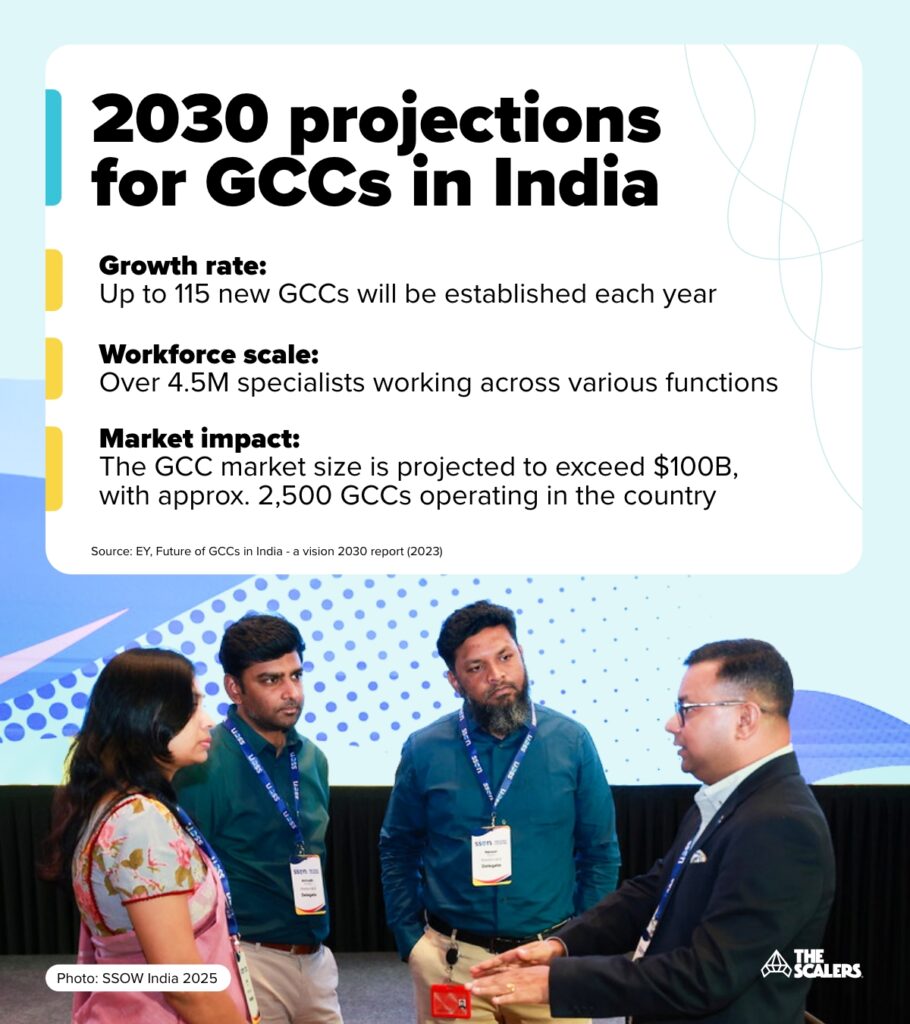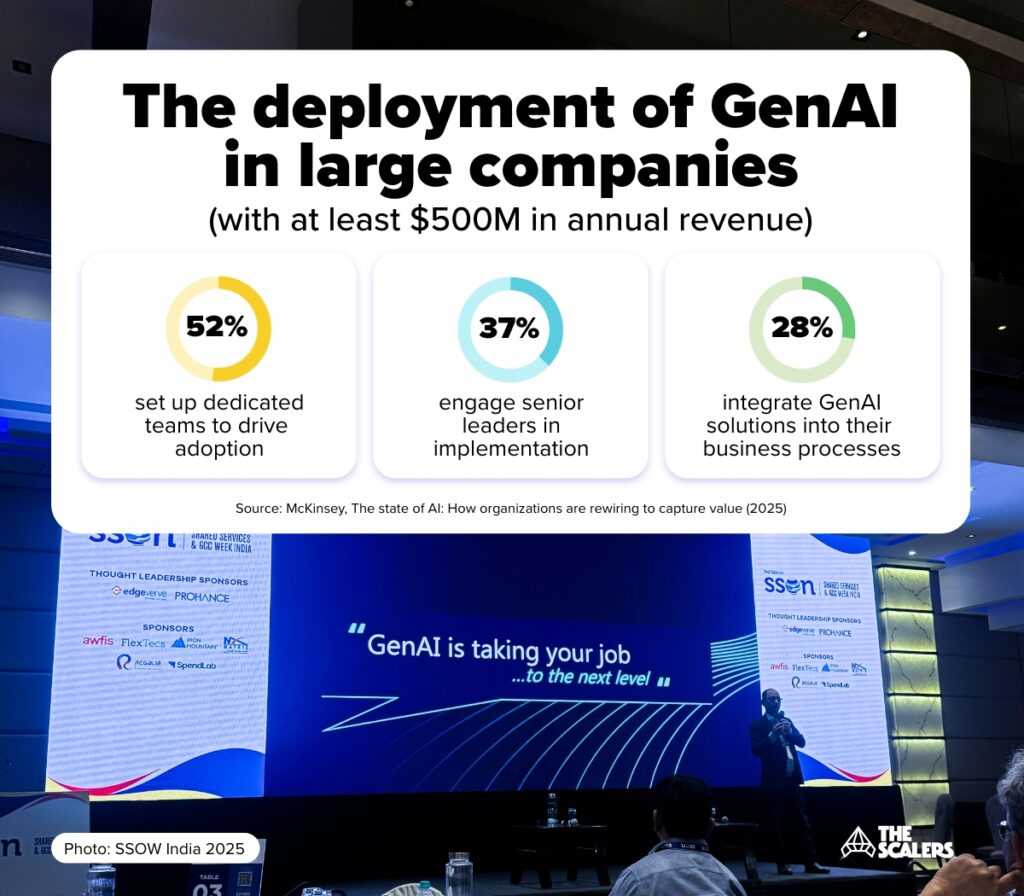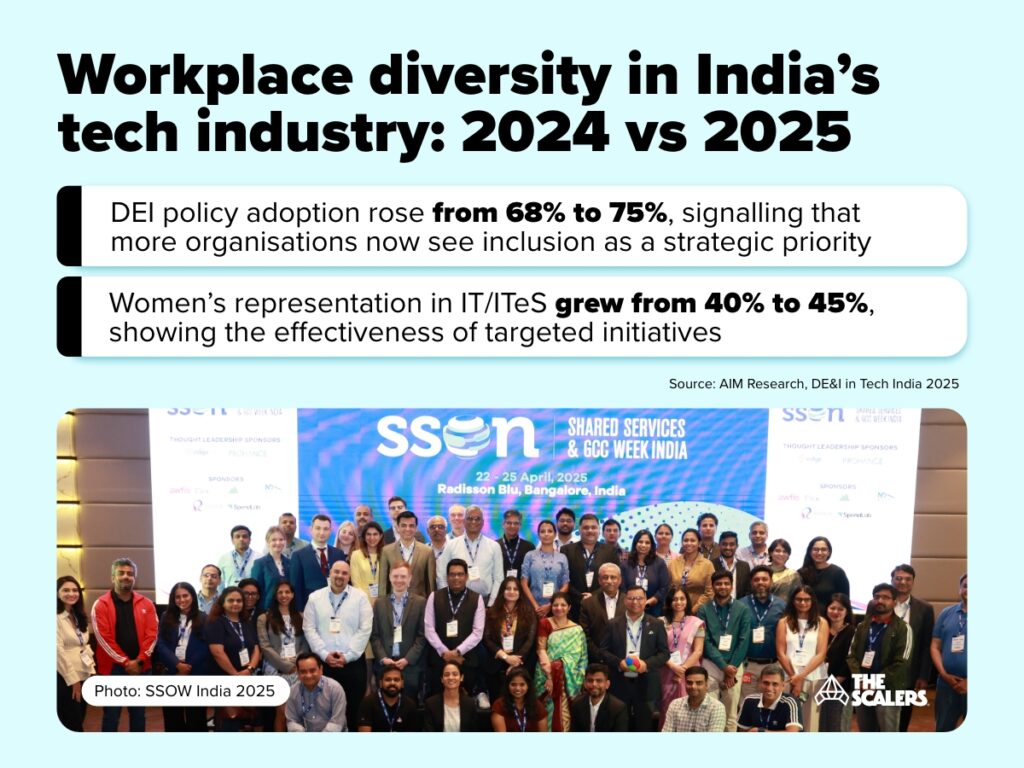You know you’re at the right event when the coffee breaks are as interesting as the keynotes. People gather informally and talk about what’s on their minds, and sometimes, if you’re lucky, you get a golden nugget: that ‘something’ a business leader won’t mention on stage, but says in the heat of the moment.
That’s the kind of insight we gathered at the Shared Services & GCC Week India 2025 this past April in Bangalore. We attended over 30 sessions across transformation, GenAI, EX, DEI, leadership, and strategy, all about what’s next for GCCs in India.
The event confirmed what we already sensed: India’s GCC landscape is changing fast… and it’s not just about AI!
Combining insights from the 200+ GCC leaders at the conference, we’ve identified five key takeaways on the future of GCCs in India.
1. The big names have turned India’s GCCs into innovation centres, not just cost-cutting hubs
Historically, multinationals opened GCCs in India primarily to cut costs and handle large volumes of transactional work. And while that still plays a role, times have changed.
Today, we see a growing trend of mid-sized GCCs of around 400-500 employees set up as agile R&D centres, focused on innovation and growth for their parent companies.
A great example is PepsiCo. At the event, we had the chance to chat with its SVP of Global Transformation and Process Excellence, Mamta Lamba. She told us that PepsiCo’s GCCs in India are now embedded into the supply chain, manufacturing, and marketing, creating value far beyond cost savings.
What we heard from Lamba matches what Jagrut Kotecha, CEO for India & South Asia, says: “India will be the engine of growth for PepsiCo,” as they are planning to consolidate its position as one of the company’s top three global markets.
With $92 billion in revenue, iconic brands like Pepsi, Lay’s, Doritos, and Quaker Oats, and operations in over 200 countries, PepsiCo’s GCCs in India are now a core part of the company’s strategy, not just a back-office function. Even the CEO and top executives are visiting the country to see the crucial role these centres play first-hand.

2. GenAI has entered the chat… but still needs some rethinking
GenAI is the buzzword on GCC leaders’ lips, with talk of Agentic AI growing louder too, but most companies have yet to show they can implement it in ways that deliver business value. Too often, they chase ‘easy wins’ by bolting GenAI onto existing, messy processes, limiting its impact and keeping teams stuck in silos.
A big reason for this is that GenAI initiatives frequently launch without involving all key stakeholders early on. When projects are driven only from headquarters without local buy-in, adoption stalls and efforts fail.
However, there are organisations like Siemens GBS that understand the value of this technology and how to use it in day-to-day operations in its GCC in India, the company’s largest technology development arm globally.
The German multinational is focusing on productivity with a structured approach: identifying experts who understand both business and tech, starting small with early use cases, and prioritising clean, high-quality data, because 90% of GenAI’s value depends on it.
Their GenAI applications include automating query handling to slash processing times, streamlining HR tasks like job postings and interview prep, and using “Tender GPT” to speed up complex document analysis, from weeks to hours. The results speak for themselves: millions saved and efficiency gains of up to 85% in certain tasks.

3. People-centric cultures for the win
GCC leaders are finally admitting one of their biggest talent challenges isn’t just hiring the right people, but retaining them. And that tracks with what we see across the industry.
For years, the unspoken rulebook was simple: hire smart people, pay them fairly, and assume they’ll stick around because the work is interesting. That model doesn’t work anymore. Many companies have learned the hard way that they can’t just treat employees well during office hours and ignore everything else.
What (really) works now is investing in what people value, like meaningful maternity and paternity support and flexible wellness budgets.
Novo Nordisk’s Corporate Vice President & Managing Director, Johan Damber, shared a story with us at the GCC Week in Bangalore about how they cut an attrition rate that was looking rather scary.
Just three years ago, this Danish global healthcare company had attrition at 18% across a workforce of 2,500, morale was low, and trust with headquarters was eroding.
To fix this persistent issue, the organisation launched Flamingo, (an employee-designed maternity support program) and rolled out WeCare, giving every employee an annual ₹50,000 wellness budget to spend on what mattered most to them.
These initiatives brought Novo Nordisk’s attrition down to 6%, and its headcount grew by an additional 2,000 in just 18 months to reach 4,500 today. It seems that when GCCs stop treating employees as cost centers and start building people-centric cultures, the business impact speaks for itself.
4. DEI isn’t an ‘HR thing’ anymore but a business driver that boosts performance
When GCC leaders in India talk about Diversity, Equity, and Inclusion (DEI), the conversation often gets stuck on gender ratios or holiday calendars. That’s slowly changing, with business leaders now co-owning DEI strategies on the ground and seeing real results, proving that it delivers tangible ROI.
Teams built from people with diverse backgrounds are delivering measurable business value. According to a McKinsey report, companies with the most diverse executive teams are 39% more likely to financially outperform companies with the least diversity, both for gender and ethnic representation.
A positive trend we’re seeing is how DEI efforts in India are expanding. Employee Resource Groups (ERGs), sponsored by business leaders and run by employees, are giving underrepresented groups, like LGBTQ+ professionals and people with disabilities, a stronger voice.
Sure, there are still bumps in the road. Recent political turmoil in the US has had an effect on DEI policies from US multinationals with entities in India. A recent survey shows that 28% are putting DEI programs on hold, and another 28% are pausing them and waiting for further instructions.
But GCC leaders in India aren’t backing down. They know inclusive workplaces deliver real business results as well as giving everyone a fair chance to grow.

5. A modern, successful GCC leader must be authentic and move beyond superficial aspirations
At GCC Week in India, the one point every GCC leader in the room needed to hear was an uncomfortable truth for some: “Relying on titles, reserved parking, or fancy offices sends the wrong signals. Real leadership isn’t about appearances; it’s about walking the talk, setting the right benchmark through consistent actions, and modelling the behaviours you actually want to see in your team.”
At Alcon, a Swiss company with its GCC located in Bangalore, leaders put this into practice. Every employee (including managers) follows the same travel policy, and unlimited sick leave is offered as a sign of trust, choosing not to penalise the majority for potential misuse by a few. These actions show that fairness builds trust far more than perks or symbols of status.
This mirrors what I see more broadly in India. The leaders who stand out are the ones who know what they’re good at, stick to their decisions, and create environments where their teams really get what they stand for.
They’re authentic, and you can feel it when you work with them.
The bottom line: GCCs in India will continue to provide great value, but are they for everyone?
Here’s where things get interesting. We regularly hear from business leaders who say, “I think we may be too small for India — we just need a few engineers.” There’s this persistent belief that India is only for the big players, the Fortune 500s with massive operations. But that’s simply not true.
What many mid-sized companies miss is that they might be too small for a traditional GCC setup, but not too small for India. There are specialised providers built specifically for companies that just want to set up an engineering and tech product development team.
The multinational case: Tesco’s incredible GCC growth
Major corporations can certainly take full advantage of India’s talent potential beyond engineering functions. At GCC Week, we gathered insights from the Tesco Business Services (TBS) leadership team on how what started as basic IT support in Bangalore has now grown into a full-fledged GCC.
Sumit Mitra, TBS Chief Executive Officer, and Urvashi Basera, Head of Enterprise Analytics, highlighted that they don’t have a single architect left in the UK: every store is designed in Bangalore, from site selection and local council negotiations to interior design and MEP engineering.
They also told us that 80% of global finance, out of Tesco’s $100B turnover, is now handled from Bangalore, along with 100% of supplier management, and 100% of the 12 million promotions run every year as part of the Clubcard programme.
Even payroll for their 330,000 employees globally is managed from Bangalore!
The mid-sized company case: Preqin’s journey from one team to a 450+ R&D Centre
Preqin is a great example of a company that started small in India but ended up building an innovative R&D centre. Their goal was to expand engineering capacity to support a flagship product, and in just five years, they grew from a four-person Scrum team to 120 engineers, plus a 300+ person Data Team.
With this growth, they added new functions and specialists as the business required, proving there’s no one-size-fits-all model for GCCs in India. It’s not about whether India or a GCC is “right” for your business, but the approach you take to build and scale your team effectively.
Key takeaways from our conversations at GCC Week India
In this article, we’ve tried to capture all the ‘juice’ from our experience at GCC Week India in Bangalore. That said, there are always bits and pieces that can’t be fully summed up in one blog post.
Here are some of the key takeaways from our talks with GCC leaders, some mentioned in the article, and some additional insights from other leaders at the event:
- India’s GCC ecosystem is massive and will keep growing. There are over 2,400 GCCs in India employing four million people, with expected revenue of $130B by 2030.
- These hubs are evolving strategically. Smaller, specialised centres of 400–500 people, instead of the typical 1,500-1,700, can deliver deep domain expertise and remain cost-effective.
- Retention is about more than perks. Safe environments, respect, and celebrating “moments that matter” are now the basics. Meaningful maternity/paternity support and flexible wellness budgets really make a difference.
- Purpose drives engagement. New-generation talent wants to understand and feel purpose in what they are doing. They don’t want to just perform tasks for the sake of building great products, but want to feel they are part of something bigger.
- Global integration matters. Best practices should flow both ways between HQ and the GCC. Companies like BP and DHL already exemplify this.
- People-centric culture pays off. Novo Nordisk’s programs cut attrition from 18% to 6% in three years, while Tesco’s Bangalore hub demonstrates how strategic operations can scale globally.
- Financial accountability (and knowing the purpose of your GCC) is essential. As the CEO of Tesco GBS said, “Building the business context is very important. If things don’t work out, we’ll lose the right to create value. You should drive margin, revenue or cash.”
| Want help with setting up a GCC in India? At The Scalers, we’ve built over 130 tech teams for organisations like Preqin with our unique offshore model. If you’re interested in exploring how offshoring with us can help you establish a GCC in India or expand your team with top software engineers, send us a message. Our experts will analyse your exact needs and help you build a world-class team! |
Build Your Team,
Not Just a Contract
With The Scalers’ offshore dedicated development team, you get engineers who join your workflow for the long run. Grow steadily, stay flexible, and work with people who care about the product as much as you do.







